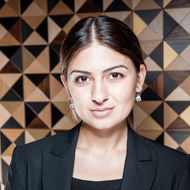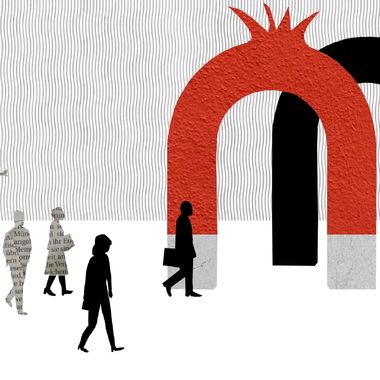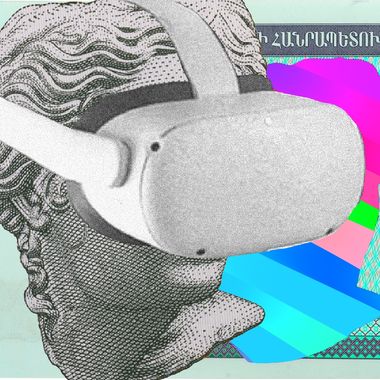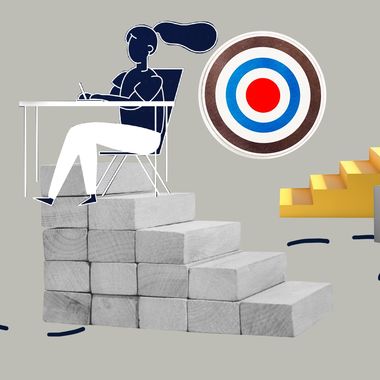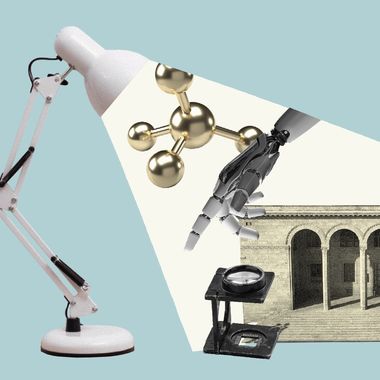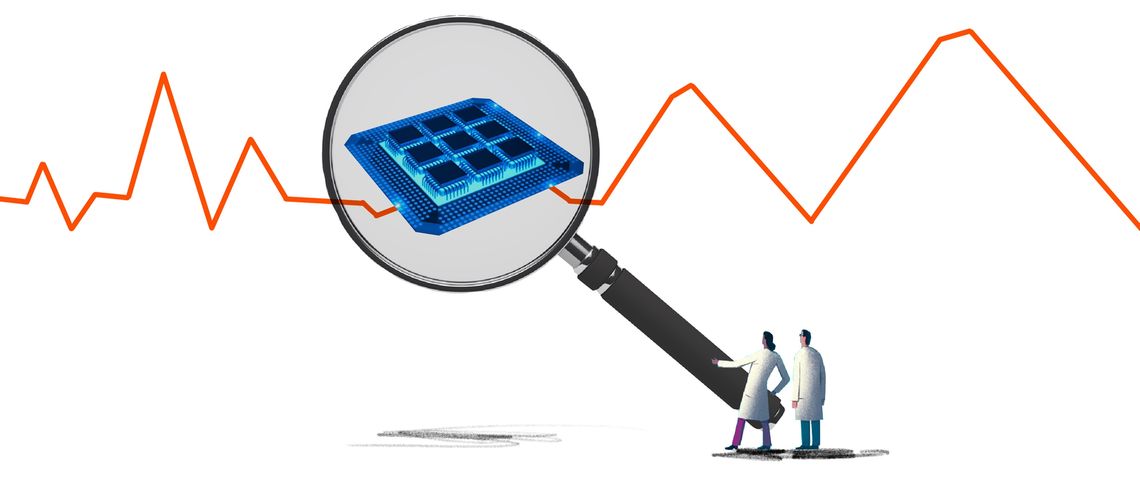
Illustration by Armine Shahbazyan.
Judging from the title, you may think that this is going to be an article about the past: the golden decades when science flourished in Armenia. It is no secret that many leave the country for better opportunities elsewhere, but a select few come back, with the belief and mission to create those very opportunities in their homeland, from scratch. No, this is not a tale of teleportation or time machines, but a guide on what can be accomplished in the present and into the future, through the lens of one visionary.
Meet Dr. Mushegh Rafayelyan: a young physicist whose long path, full of numerous challenges, rejections and skepticism, landed him back at his first alma mater, Yerevan State University (YSU), where he is a Senior Researcher in the Faculty of Physics. The research group under his supervision has been working in the field of optics and neuromorphic photonic computing since September 2020. Rafayelyan holds two PhD degrees: one from YSU, the other from the University of Bordeaux in France. He has also completed a postdoctoral study at Laboratoire Kastler Brossel and has authored or co-authored more than 20 published scientific articles.
Rafayelyan went through several transitional periods, both as a researcher and as an Armenian willing to invest in the development of Armenia’s science ecosystem, which has degraded dramatically in the years following independence. This lag in modern development can be attributed to a variety of reasons, namely the lack of funding, the limited number of research projects, a shrinking community of world-class scientists… the list goes on.
Rafayelyan could not see career growth in such an environment. So, while still enrolled in a PhD program at YSU, he started looking for opportunities outside of Armenia. In 2013, he was accepted into the University of Bordeaux in France. Despite a more beneficial environment in his new program, he continued his doctoral research at YSU remotely, which he successfully completed in 2015.
Comparing his parallel studies at two different universities, Rafayelyan explained that his research studies in Armenia were mostly theoretical, and he was not exposed to enough opportunities for experimental research, due to the shortage of labs and necessary equipment. Meanwhile, at the University of Bordeaux, he was provided with plenty of tools to conduct experimental research, and thus boost his burgeoning career in science.
Despite the dynamism of his new prosperous environment, Rafayelyan always knew that, one day, he would return to Armenia and continue his research projects there. However, “that day” seemed to be far away, as it would require a community of scientists in his optical physics specialization who could keep up with world developments while supervising and growing a new generation of researchers. While he decided that he would take the lead and supervise himself, he felt that he was not yet ready to take on that immense responsibility.
He also wanted to explore the industrial implementations of research, so he attended a conference where he could compare industrial and science expositions. “I was curious to see both science research and their applications in the industry and explore how today’s innovations can be transitioned into technological and engineering solutions,” he explains.
However, Rafayelyan soon realized that “the majority of tech companies and startups use mostly old scientific findings or inventions for their complex engineering solutions. After all, it takes years to see the fruits of science research, in the form of products and technologies, and those products were the applications of research conducted at least five years before,” he explains. He was offered a position as an engineer at a start-up, but his passion lay purely in the science field, so he continued a career in academia.
After completing his second PhD, Rafayelyan was accepted into the Kastler Brossel Laboratory in France as a post-doc researcher. This experience impacted his growth immensely, as he dove deeper into his topic of interest, optical computing, while growing new connections with European scientists. He also witnessed successful supervision practices in the lab, which impelled him to think about supervising; this time, he felt ready for it.
However, as compelling as the opportunities of the advanced labs in Europe seemed, Rafayelyan didn’t consider them. He thought that he could leave a bigger impact if he pursued those opportunities in Armenia. He soon received an invitation to take part in the nation’s Science and Technology Convergence Conference (STCC) 2019.
“This was a chance for me to explore the science and tech ecosystem in Armenia from another perspective and to enlarge my network. I realized that the lack of opportunities in Armenia can turn into new chances for starting something from scratch. At the same time, due to our unique culture and the collective efforts of the tech sector, I always had support to succeed in my endeavors. Others would see me and my ideas as part of a whole, not just a stand-alone project,” Rafayelyan explains. In 2020, he completed his research in France and resolved to start a research lab in Armenia.
In the past year, Rafayelyan and his team have faced several challenges, for which they have crafted several solutions. Here, we’ve combined some of them with his thoughts, hoping that they may be a helpful guide for other researchers to start their own projects in Armenia.
Turning Challenges Into Opportunities
Indeed, Armenia is a small country with a small community. However, with an opportunist’s mindset, one can find the advantages in that. For example, the support of a big team in a small community is massive, from many people who are not even working on your project. Due to a shortage of resources and opportunities, those who still remain in the science development field are very ambitious and have each other’s backs. While this is not a common phenomenon in the global community scene, it provides a solid foundation for one’s professional network and global connections. Moreover, one can still cooperate on several projects to construct the foundations for bigger ones in the future.
Relocation is Not an Emotional or Spontaneous Decision
It’s important to understand that researchers commit to their projects for years and it’s hard, or even impossible, to convert them for relocation in the middle of research. As in Rafayelyan’s case, to avoid further disappointment, they may need time to closely explore the ecosystem’s flaws and opportunities, in order to create realistic plans accordingly. On the other hand, this commitment does not limit them from further opportunities outside of Armenia. “If I realize that I’m facing blocks or I need more opportunities for succeeding in my research, I may move again or shift to something else to get what I need for my success. I suggest not being afraid of changes, as long as you have the vision of succeeding in Armenia,” Rafayelyan recommends.
In Search of Funding
Sadly, salaries are low for researchers in Armenia. From a budgeting perspective, it is more affordable to collect a research team in Armenia. Most grants cover equipment costs and do not require much expenditure for salaries. Recently, the government promised to gradually increase the salaries for researchers, which can modestly help to create a favorable environment for starting research groups in Armenia.
However, there still are several research grants for both groups and individuals.
Most of the grants that Armenian research groups receive are provided by the Science Committee of the Ministry of Education, Science, Culture and Sport, and Rafayelyan’s group is not an exception. He had received several rejections from different foundations, but he never gave up; instead, he took lessons and prepared even better.
Rafayelyan specifically pointed out a Postdoctoral fellowship opportunity in the scope of Marie Skłodowska-Curie Actions by the Horizon Europe project. It provides mobility grants for starting research in Horizon Europe associated countries, like Armenia. One of the criteria states: “[applicants] must not have resided or carried out their main activity (work, studies, etc.) in the country of the beneficiary (for European Postdoctoral Fellowships), or the host organisation for the outgoing phase (for Global Postdoctoral Fellowships) for more than 12 months in the 36 months immediately before the call deadline.” This project grant is also very beneficial for diasporan Armenians whose main activities are outside of the Republic of Armenia.
“This was the ideal opportunity for me to start research at the A.I. Alikhanyan National Science Laboratory. Although I didn’t receive funding, my application scores encouraged me to continue improving project applications, and I succeeded in the end. I’d highly recommend this to Armenians residing or working outside of Armenia,” explained Rafayelyan. For such an ideal opportunity, Rafayelyan was surprised to find out that he was the first person applying to start research in Armenia. While many may complain of the lack of opportunities in the country, they also do not even try to pursue the ones that do exist. This fellowship has been available to those in Armenia for several years now.
Another problem that Rafayelyan pointed out is the lack of science promotion. Instead of focusing on patriotic messages, we need to highlight existing opportunities in Armenia, such as the Armenian National Science and Education Fund, which also provides grants for post-doc researchers. “If we desire enough, we’ll find more opportunities. And in my opinion, the state or other respective institutions should work on intriguing that desire, as negative information spreads faster and disappoints people,” summarized Rafayelyan.
Thus, not only can one find opportunities to counteract challenges, it is also possible to turn those challenges into new opportunities through a big desire and vision. To conclude, here are a few of the informative platforms and initiatives run by enthusiasts eager for science promotion and communication, where they provide consistent updates on science news, opportunities and successes in Armenia:
-
Gituzh - a movement of Armenian technology and business leaders
-
Հզոր Գիտություն, Հզոր Հայաստան (Strong Science, Strong Armenia - a movement of Armenian scientists)
-
Gitak.club - a platform where students meet supervisors
-
Հիմնարար գիտություն (fundamental science) telegram news channel
Creative Tech
Digital Pomegranate and Distrikt: Connecting Tech to Sustainable Living in Gyumri
By Hovsep Markarian
Digital Pomegranate, already into its eighth year, has played an active role in shifting the image of Gyumri from a city of poverty and tragedy to a city with a viable future. Its new project, Distrikt, promises to be the first SDG compatible community in the world.
An Armenian Painter’s Foray Into the Cryptic World of NFTs
By Lilly Torosyan
Masha Keryan collaborated with Armenian AR/VR game development app Arloopa on an experimental project to showcase some of her artwork digitally. The result was their first-ever AR exhibition of NFT pieces and VR Tilt Brush sculptures.
Edu2work: A Navigation Tool Bridging the Gap Between Education and Labor Markets
By Ruzanna Baldryan
How an AI-powered platform that analyzes thousands of online job postings from a wide variety of commercial websites to provide insights into the labor market can make data-driven decisions come to life.
The Myth of “National” Science
By Gagik Tovmasian
The current state and future direction of science in Armenia has been discussed on various platforms recently. Gagik Tovmasian writes about the need to elevate the status of national institutes and willingness to open up to the world.
Legal Institutions for an Emerging Technology Economy
By Henry Nikogosyan
On the path to becoming a serious player in the global tech sector, Armenia needs to foster an environment that allows technology companies to achieve their business goals, which includes legal institutions to resolve complex disputes.
Gitak: Bridging Students With Supervisors for Science Research
By Tatev Mkrtumyan
With the absence of qualified academic supervisors and challenges with the quality of student research, there was a need to develop a platform where students and supervisors could meet remotely.

